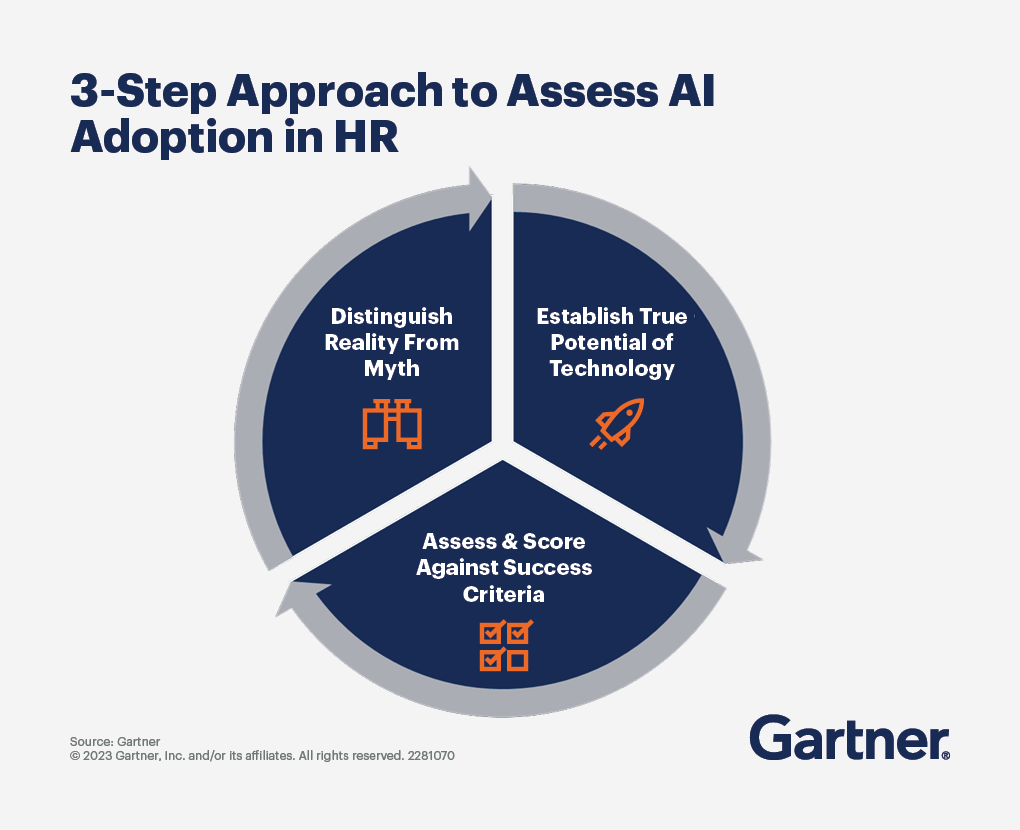Artificial Intelligence (AI), particularly Generative Artificial Intelligence, is becoming an integral part of businesses, with Human Resources (HR) being no exception. People management, which in many organizations has already automated certain tasks according to best practices, could become even more effective with the introduction of AI in HR.
The inevitability of AI in HR involves the use of machine learning (ML), natural language processing (NLP), and other AI technologies to automate tasks and support decision-making, as explained by IBM.
Automating tasks frees up time for HR departments to focus on more strategic activities, while predictive analysis contributes to more informed decision-making.
We are on the brink of a new era in human resources management, leveraging technologies where data analysis, machine learning, and automation together save time for HR, yielding higher quality results with greater efficiency and innovation.
Through a strategic approach to generative AI in HR departments, processes are optimized, analyses improved, talent attraction and management enhanced, and employees feel more engaged. Finding data, discovering information, consolidating knowledge, and finding solutions now happen almost in real-time.
However, it’s important to be mindful of potential pitfalls. It is crucial to consider ethical and employee privacy issues when reshaping traditional processes, starting from application design.
This article explores the opportunities, challenges, and ethical considerations surrounding the relationship between AI and HR. Its goal is for you to be better prepared for the future of Human Resources in your organization. Generative AI will not take jobs away from employees, but it will certainly change how they perform certain tasks.
What is Generative AI, and What Can It Do for HR?
Generative AI systems or models, discussed in this article, autonomously generate new content such as images, text, audio, video, and even code. In practice, generative AI reproduces human patterns of speech and writing. This approach contrasts with traditional discriminative AI, commonly used to classify or label existing data.
Generative AI contributes to improving the efficiency and effectiveness of HR departments at an accelerated pace. Consider this: in November 2022, just over a year ago, OpenAI’s ChatGPT was announced. It quickly gained millions of users.
Shortly after, it was also integrated into Microsoft’s Bing. Meanwhile, other options emerged rapidly, such as Google’s Bard, Microsoft’s Copilot, and the more recently announced Google Gemini. Note that these are just examples of generative AI tools, and many others have emerged and will continue to do so.
Postponing AI in HR is Falling Behind
More than three-quarters (76%) of HR leaders believe that if their company does not adopt or install AI solutions, such as generative AI, in the next 12 to 24 months, organizational success will lag behind the competition, according to Gartner.
For this reason, HR decision-makers should stay abreast of technological trends to adopt a structured approach to evaluation and make effective decisions about the adoption of new AI solutions in HR.
- Despite concerns related to data privacy and ethical matters, 52% of HR leaders surveyed in June 2023 by Gartner said they were exploring use cases and potential opportunities related to generative AI.
- On the other hand, a global study by the IBM Institute for Business Value (IBV) revealed that 87% of respondents believe that the roles played by employees are more likely to increase than be replaced by generative AI. The effects will vary depending on the types of roles.
- Many surveyed HR leaders reveal that AI is already being used in areas such as employee record management (78%), payroll and benefits processing (77%), recruitment and selection (73%), performance management (72%), and onboarding new employees (69%).
- Regarding the future, 92% of HR leaders intend to increase the use of AI in at least one HR area, including performance management (43%), payroll and benefits administration (42%), recruitment and selection (415), onboarding new employees (40%), and employee record management (39%).
- The IDC’s Future of Work 2022 study also predicted that by the end of 2023, 60% of 2000 global businesses would use AI and ML tools to support the entire employee lifecycle, and by 2024, 80% of those organizations plan to use AI/ML tools for hiring, firing, and training employees.
- A survey by OpenAI, cited by McKinsey, states that generative AI can be used in the majority of professions, noting that 80% of jobs can incorporate this technology and capabilities into tasks performed today.
Opportunities of AI in HR Departments
The two major areas in which AI can contribute to improvements in HR are the automation of routine tasks and predictive analysis to support decision-making.
The new platforms have the potential to significantly alter HR work, making it more efficient and personalizing the employee experience. “AI has the potential to revolutionize HR practices because it can improve efficiency, effectiveness, and decision-making in HR functions," states the article “A study of Artificial Intelligence impacts on Human Resource Digitalization in Industry 4.0," published in the Decision Analytics Journal.
Recruitment, Selection, and Hiring Processes
AI can contribute to a quick and efficient resume analysis and can also conduct virtual interviews, assessing facial expressions, body language, and even tone of voice, providing additional data about candidates.
Performance Management and Evaluation
AI platforms can analyze real-time performance data, facilitating the identification of trends and patterns in employee performance, contributing to decision-making regarding promotions or professional development.
Training and Professional Development
With AI-based systems, it is possible to identify knowledge gaps and customize training programs for each employee.
Employee Integration and Engagement
AI algorithms can identify patterns and trends, indicating low employee engagement or high turnover rates. Tools can analyze morale to identify concerns and improve employee satisfaction.
Talent Management and Retention
AI tools can identify turnover trends, aiding in the creation of proactive talent retention strategies. AI can help identify employees with the potential to take on higher responsibilities within the organization through the analysis of skills, experience, and performance.
Health and Safety at Work
The use of AI in HR can also help identify and prevent workplace accidents. AI systems can analyze data from various sources, such as sensors, cameras, or other equipment, to identify potential issues in the workplace, contributing to avoiding safety risks and health issues.
Predictive Analysis
AI can replace or complement existing tools, especially in analytics. It can use historical data to predict future patterns related to recruitment, performance, and talent retention, providing useful insights for strategic decision-making.
In summary, AI serves HR in various areas, including employee record management, payroll processing, benefits administration, and HR support or service desks.
Challenges in Introducing AI Technology in HR Departments
The introduction of AI technology in HR departments is inevitable, as AI presents opportunities for optimizing HR practices. However, it is crucial to ensure ethical, transparent use aligned with organizational values.
Employee privacy must be safeguarded through a data management strategy, even before AI systems are used to collect and analyze personal data. Ensuring transparency is essential.
A joint and responsible effort from HR professionals and AI technology is crucial to maximize its benefits. Only in this way can a balance be found between efficient automation and human sensitivity. Everyone must recognize that, despite the benefits, AI does not replace human interaction, and it is necessary to maintain a balance to reap the benefits of AI without falling into traps.
AI, being technology, is also susceptible to cyberattacks. IT departments must strengthen cybersecurity and create plans to keep AI projects secure throughout their lifecycle.
Companies should also plan for the introduction of new skills and the restructuring of jobs using AI, by valuing employees undergoing these changes.
No matter how efficient they are, produce valuable insights, or offer personalized experiences, the use of generative AI tools must respect the human essence of employees.
Ultimately, the success of implementing AI tools in HR practices depends on how efficiently organizations balance the advantages of automation with the need for empathy and human supervision in HR practices.
Also, remember that AI is anything but static, requiring continuous monitoring and adjustments to avoid misinformation and outdated information.
Is Your Company Ready to Integrate AI Technology?
Before adopting or choosing technology to adopt, Gartner recommends analyzing the offering before adopting solutions:
Distinguish reality from myth. HR leaders must work together with IT and compliance departments, along with subject matter experts, to understand the true potential of technology. It is necessary to debunk the myth that “technology will replace employees," as it will actually contribute to improving their efficiency and productivity.
Calculate the potential of AI and its benefits for HR, say analysts. HR leaders need to define potential benefits and align potential use cases with organizational objectives. AI should help alleviate functional issues, allowing tasks to be executed more efficiently, quickly, and at lower costs.
Evaluate and rank AI solutions based on success criteria to determine whether to proceed with adoption. Criteria vary from organization to organization, but key areas to consider include governance, employee preparedness, risks, and ethics.

From another perspective, it is necessary to identify areas that need improvement and assess the potential return on investment, explains the article “Navigating The AI Revolution In HR," published in Forbes. These are the questions HR leaders should consider when evaluating the adoption of an AI solution:
- What specific challenges do you want to address?
- How is it integrated with existing HR systems?
- What is the expected ROI, and how long does it take to implement?
- How will privacy and security be ensured?
- What ongoing support and maintenance are provided?
How to Implement an AI Strategy in the HR Department
Finally, here are some tips for implementing an AI strategy in HR. To start, HR departments should seek the support of key decision-makers, employees, and other stakeholders.
To do this, the HR department must demonstrate the potential benefits of the aforementioned AI tools. It can also present case studies of successful AI development in similar organizations, highlight cost savings and efficiency gains, and address common concerns such as changes in jobs. Clear and transparent communication is essential to build trust.
Identify HR Processes for AI Integration
Choose processes that can be complemented with AI. Start with areas where AI can immediately add value to your team, including repetitive tasks, data analysis, or improving the candidate selection process.
Collaborate with IT Leaders
A successful AI project launch requires close collaboration between HR and IT leaders. Establish clear communication channels, involve IT in the assessment and selection process, and ensure that IT resources are available for development, maintenance, and continuous improvement of systems.
Consider Legal and Regulatory Issues
When adopting AI technologies, consider all relevant legislation related to data protection, privacy, and discrimination. Compliance prevents potential lawsuits. Also, make sure to define data governance policies and regularly review and update systems.
Measure Technology Success
Establish clear key performance indicators (KPIs) to measure the success of your AI initiative. They should be assessed and adjusted regularly to optimize results. Consider variables such as cost savings, process efficiency, employee satisfaction, and improved decision-making.
Allocate Employees to AI Supervision
Supervising AI programs is important. Look for candidates with technical knowledge of AI and data analysis, deep HR knowledge, and strong communication skills.
Train Teams in AI Tools
Training current HR teams in AI tools should be an integral part of the implementation strategy. Conduct training sessions with online resources and practical learning opportunities. Encourage a culture of continuous learning and provide support to ensure that employees fully understand the application of technology in their roles.
In conclusion, generative AI is already being used or will be used in your company’s HR department. It is inevitable. If you haven’t already, you should analyze the pros and cons, challenges, and opportunities that AI brings to your organization.
Automation of routine tasks will free up time for more strategic activities. Predictive analysis will contribute to well-informed decisions."

by Ricardo Barros – Chief Customer Success Officer @Uniksystem
Share!

